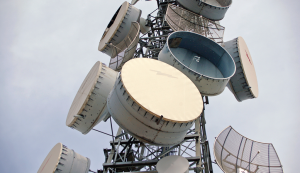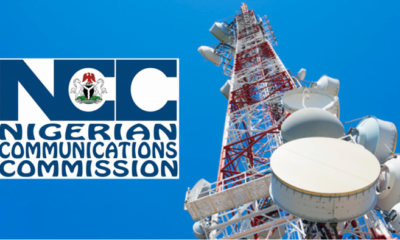Communication
Multiple regulations, taxes’ll soon be over –NCC

ABUJA-THE Executive Vice Chairman of the Nigerian Communications Commission, Prof. Umar Danbatta, on Friday said that if talks with the Nigeria Governors Forum were anything to go by, multiple regulations, taxes and right of way issues would be over soon.
Besides talks with the NGF, the NCC, he said, had also engaged other agencies of government in talks with a view to improving relationship with telecommunications service providers who are often the victims of the multiple taxes and regulations.
Danbatta spoke in Abuja when he received the management team of ATC Wireless Infrastructure Company of Nigeria, an infrastructure management company.
The commission’s EVC said that the NCC as a responsible regulatory agency was worried about multiple regulations and taxes because they do not augur well for smooth development of the telecommunications sector.
He said, “So we have decided to engage all stakeholders, especially other government agencies, in order to cushion the pains operators go through.
“The NCC is particularly worried about the indiscriminate way base transceiver stations are sealed by agencies and some state governments and we have appealed to these agencies and the state governors to show some understanding.”
He added, “We are particularly in talks with them to understand the implications of these actions as they affect quality of service and other sundry matters, including power supply.”
He therefore implored ATC Nigeria to ensure regular power supply to the managed base stations in order to make a difference, “because government has created an enabling environment for businesses to thrive.”
Earlier in his remarks, the Chief Executive Officer, ATC Nigeria, Mr. Gordon Porter, said his team came to familiarise itself with the NCC management and to “tell you what we do, how we do it and why we do what we do.”
ATC had recently acquired 4716 cell sites from Bharti Airtel Nigeria and for the past 146 days it has deployed 1,000 generators and replaced 600 air-conditioning units.
So far, over $11m has been invested by the company in these towers with a view to improving quality of service.
“ATC has been in constant talks with host communities with a view to improving relations and right-of-way,” Porter said.
He said that although it had a commercial relationship with Airtel, it was interested in working with other operators, especially on the issue of co-location, adding that ATC hoped to inject about $100m in the business in the next two years.
Communication
NCC Greenlights New Tariff Structures For MTN, Airtel, Glo, Others
The Nigerian Communications Commission (NCC) has approved new tariff guidelines for telecommunications operators to enhance transparency, improve consumer understanding, and foster fair competition among its licensees.
The commission has also mandated that all telcos in the country limit the number of available tariff plans to a maximum of seven.
This information was disclosed in a document posted on the NCC’s website and signed by the Executive Vice-Chairman of the commission, Aminu Maida, on Saturday.
Read Also: NIN: MTN, Others Barred From Deactivating Lines
In addition, the number of bundles offered per operator has been reduced to 100, with the directive that no subscriber can be on more than one tariff plan at a time.
The NCC defines a tariff plan as a structured pricing scheme outlining the charges and conditions under which telecommunications services are provided to subscribers.
The document read in parts, “The number of tariff plans offered per operator is limited to seven, and the number of bundles offered per operator is limited to 100.
“There are no limitations to the number of add-ons a subscriber can opt into. However, each operator must have in place a mechanism that informs subscribers of the number of add-ons they have at the point of purchasing another add-on. Subscribers must be able to check (via USSD string, SMS) the number of add-ons purchased.”
It has been reported that the two leading telecommunications companies in the country are currently offering more tariff plans than allowed by the new directive.
MTN offers eight tariff plans, Etisalat has seven, Airtel provides ten plans, and Glo offers its customers four tariff plans.
In the “Guidance for the Simplification of Tariffs” document, the NCC stressed the importance of fully disclosing all tariff components and terms, requiring telecommunications companies to ensure that all marketing and promotional materials are easily understandable.
The NCC also underscored the necessity for operators to prioritize consumer education and transparency in all communications to enable subscribers to make well-informed decisions.
It said “Develop and submit detailed migration plans to transition subscribers smoothly to new tariff plans, without loss of service quality or benefits.
“All promotional elements must receive prior approval from the Commission and should be offered as standalone products with clear terms and validity periods.
“Submit comprehensive periodical reports detailing all active tariff plans, bundles, promotions, and Quality of Service (QoS) metrics. The guidance shall take effect on 29 July and will remain valid and binding on licensees until further reviewed by the commission.”
“Operators can choose to maintain only one bonus-led new subscriber acquisition plan. However, a new subscriber can only be retained on such a plan for a limited period of six months before being migrated to a standard tariff plan of their choice.
“Where a subscriber fails to migrate after being prompted in accordance with the applicable business rules, the subscriber will be reverted to the default tariff plan.
“Tariff elements of promotional activities/new acquisition plans referred to above will only be allowed under the following conditions: bonuses must comply with the commission’s price floor and price cap.
“In addition, actual depletion rates on bonuses must not exceed the price or fall below the price floor for voice services. The bonus allowances (voice/data/SMS) must be stated in naira terms and minutes/seconds for voice, GB/MB of data and number of SMS. Operators must fully disclose the above in their advertising materials.
The telecommunications regulator also stated that add-on subscriptions must be optional for subscribers.
According to the directive, “Subscribers should be able to purchase any add-ons of their choice while remaining on their existing tariff plan and/or bundle.”
The directive also specifies that a free add-on must be treated as a promotional offering and requires approval from the Commission in accordance with the 2023 guidelines on promotional advertisements.
Additionally, in line with existing regulatory instruments, service providers must obtain evidence of informed consent from subscribers before accepting an add-on.
The NCC noted that there are penalties for non-compliance with the guidance and that operators must adjust their offerings to comply within 90 days from the date of the directive issued on Saturday.
The commission noted “Transition plans for existing tariffs must be submitted on or before 12 August 2024. The Commission will review and respond to submissions within 10 working days.
“Tariff approval and modification applications must include comprehensive disclosure forms detailing all aspects of the tariff.
“Non-compliance will result in penalties, including fines, suspension of tariff approvals, or other regulatory actions as set out in the Act, related regulatory instruments and the subsisting Enforcement Process Regulation.”
The NCC has mandated that operators must notify subscribers of any changes to their tariff plans, including transitions to new plans, with at least 30 days’ notice. The commission emphasized that “notifications should be clear, outlining the reasons and benefits involved.”
In related news, operators have denied claims that the commission has approved a tariff increase. Gbenga Adebayo, Chairman of the Association of Licensed Telecom Operators in Nigeria, stated, “Telecommunications companies have not received any authorization for a tariff review.”
Additionally, inquiries made by our correspondent via calls and text messages confirmed that the rates remain unchanged.
Communication
Nigeria’s Telecom Market Eyes $11.43bn Value By 2029

In a significant market projection, Mordor Intelligence predicts that the Nigerian telecom sector is set to surge to a value of $11.43 billion by 2029.
The report anticipates a steady growth trajectory with a cumulative average growth rate (CAGR) of 4.70% between 2024 and 2029, based on the current market value of $9.09 billion.
The transformation of Nigeria’s telecom landscape, fueled by government initiatives to boost internet infrastructure and broadband connectivity, coupled with rising data consumption, 5G deployments, and innovative strategies from major telecom players, is expected to drive this substantial market expansion.
The report underscores additional factors propelling the growth of Nigeria’s telecom sector, emphasizing the surge in smartphone adoption.
the report said “Increased smartphone adoption in Nigeria has fueled the development of a dynamic digital services sector. Currently, millions of Nigerians use mobile apps, including social networking sites, e-commerce, and financial services.
“These apps could leverage smartphones’ capabilities to offer speed, convenience, and efficiency, encouraging more people to invest in smartphones.
“In addition to these expansions and collaborations, the growing adoption of digital technologies and government support in aiding the same alongside the 5G technology implementation across the country is analyzed to boost the demand for telecom towers significantly.”
“In addition to these expansions and collaborations, the growing adoption of digital technologies and government support in aiding the same alongside the 5G technology implementation across the country is analyzed to boost the demand for telecom towers significantly.”
Mordor Intelligence highlights that the flourishing e-commerce and digital service platforms in Nigeria are significant drivers behind the escalating demand for dependable telecom services in the country.
Communication
MTN Set To Partially Disconnect Glo Network

The Nigerian Communications Commission (NCC) has granted MTN’s request to partially disconnect Globacom (Glo) from its network owing to unsettled interconnect charges.
Reuben Muoka, the NCC’s Director of Public Affairs, disclosed this in a document named ‘Pre-Disconnection Notice’ on Monday.
The move follows Glo’s persistent failure to clear its outstanding debts despite multiple attempts to resolve the issue.
Under this partial disconnection, Globacom subscribers will solely receive calls from MTN users, while retaining access to other network services like outgoing calls to other networks and data services.
However, they won’t be able to initiate calls to MTN users during this period.
The statement read, “All subscribers are, therefore requested to take notice that the Commission has approved the Partial Disconnection of Globacom to MTN in accordance with Section 100 of the Nigerian Communications Act, 2003 and Paragraph 9 of the Guidelines on Procedure for Granting Approval to Disconnect Telecommunications Operators, 2012.
“At the expiration of 10 days from January 8, 2024, subscribers of Globacom will no longer be able to make calls to MTN but will be able to receive calls.
“The Partial Disconnection, however, will allow in-bound calls to the Globacom network,” it added


















